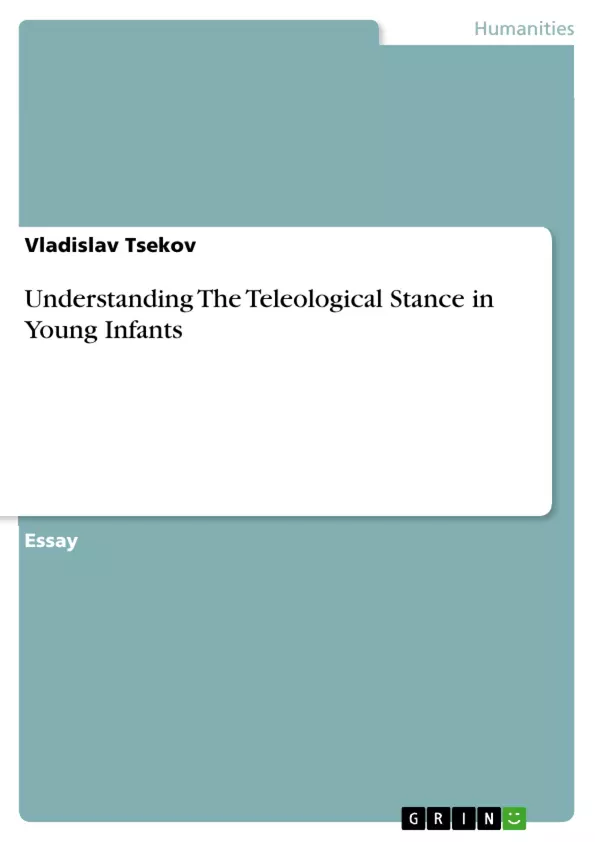Very few things happen without a reason. People are in constant search of meaning behind actions of others, looking for purpose and goal-directedness in every behavior. Infants too have this outstanding ability. They can interpret other’s goal-directed actions as early as 12-months-old. Unlike adults however, they do not understand that intentions, beliefs and desires are the actual driving force behind goal-directed actions. This notion develops only as they grow up.
Rather, they make use of a special non-mentalistic interpretational system: the Teleological Stance. As a result, infants interpret an action as goal-directed only if it satisfies two conditions: (1) an action must function to realize goals and (2) it must do so by the most efficient means available. This is known as the Rationality Principle, the main mechanism by which the Teleological Stance works.
Inhaltsverzeichnis (Table of Contents)
- Experiment
- Results
- Conclusion
Zielsetzung und Themenschwerpunkte (Objectives and Key Themes)
This paper explores how young infants understand goal-directed actions, focusing on the development of their ability to interpret behavior in terms of intentions and desires. It examines the "teleological stance," a non-mentalistic representational system used by infants to interpret actions as goal-directed, and its underlying mechanism, the "Rationality Principle."
- The development of goal-directed action interpretation in infants
- The "teleological stance" and its role in infant cognition
- The "Rationality Principle" as a mechanism for interpreting goal-directed actions
- Empirical evidence supporting the teleological stance in 12-month-old infants
- The role of efficiency and goal-achievement in infant understanding of actions
Zusammenfassung der Kapitel (Chapter Summaries)
The paper begins by introducing the concept of the "teleological stance" and its role in understanding goal-directed actions in young infants. It contrasts this with the "mentalistic stance" used by adults, highlighting the developmental shift in understanding intentions and desires. The "Rationality Principle" is then introduced as the key mechanism underlying the teleological stance, emphasizing its two core assumptions: actions must achieve goals and do so efficiently.
The experimental section presents a study by Gergely et al. (1993) that provides empirical evidence for the teleological stance in 12-month-old infants. The study involved two groups of infants: a Rational Group and a Non-Rational Group. The Rational Group was habituated to a scenario where a small circle approached a large circle, overcoming an obstacle in the most efficient way. The Non-Rational Group was habituated to a similar scenario, but the small circle took a less efficient route. The results showed that infants in the Rational Group were more likely to interpret the small circle's action as goal-directed, suggesting that they were using the teleological stance and the Rationality Principle to interpret the behavior.
Schlüsselwörter (Keywords)
The paper focuses on the concepts of goal-directedness, the teleological stance, and the Rationality Principle. It explores the development of these concepts in young infants and provides empirical evidence for the teleological stance as a key mechanism for understanding goal-directed actions. The research highlights the importance of efficiency and goal-achievement in infant cognition.
Frequently Asked Questions
What is the "teleological stance" in infants?
It is a non-mentalistic interpretational system where infants interpret actions as goal-directed based on observable efficiency and results, rather than intentions.
How does it differ from the adult "mentalistic stance"?
Adults understand that beliefs and desires drive actions. Infants (around 12 months) primarily use the Rationality Principle to judge goal-directedness.
What is the Rationality Principle?
It is the mechanism where an action is seen as goal-directed if it functions to realize a goal and does so by the most efficient means available.
What did the Gergely et al. (1993) experiment show?
The study provided empirical evidence that 12-month-old infants expect actors to take the most efficient path to a goal, supporting the teleological stance theory.
At what age can infants interpret goal-directed actions?
Research shows that infants can interpret actions as goal-directed as early as 12 months of age.
- Arbeit zitieren
- Vladislav Tsekov (Autor:in), 2014, Understanding The Teleological Stance in Young Infants, München, GRIN Verlag, https://www.grin.com/document/356506



